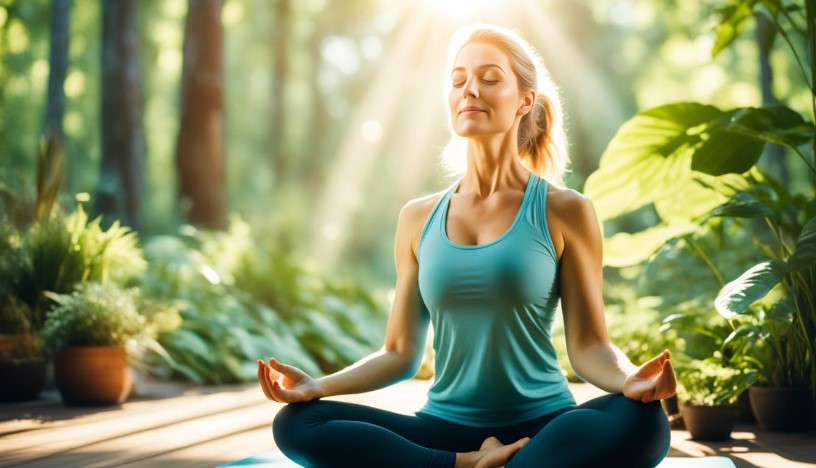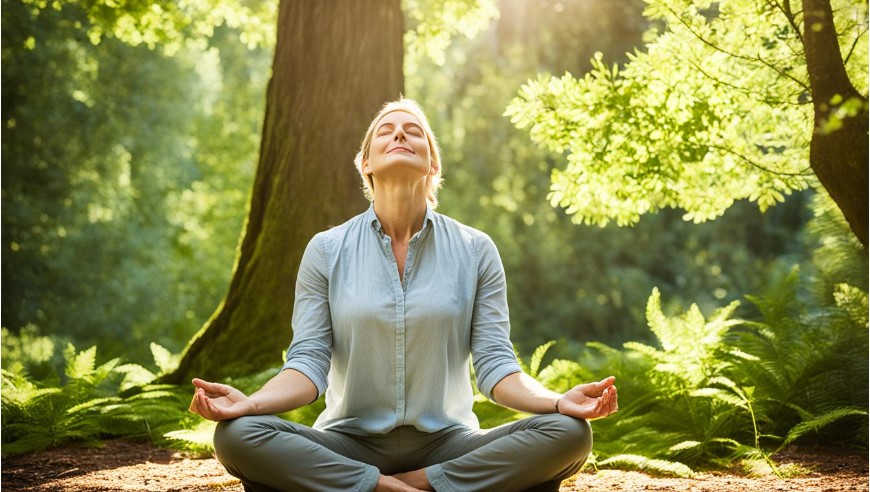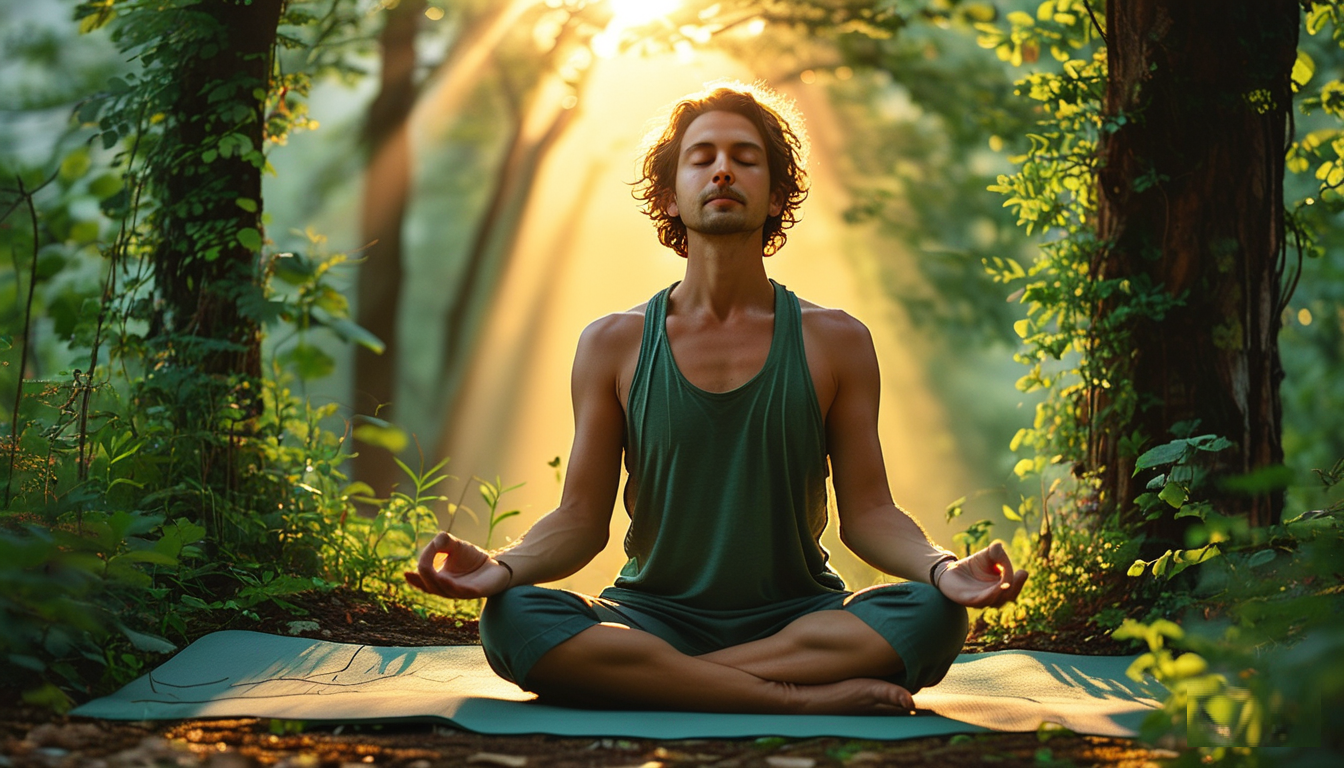In today’s fast-paced world, yoga stands out as a key method for boosting mental health and cutting down stress. It combines the mind, body, and breath for a comprehensive approach to self-care. This holistic method significantly affects our emotional and psychological well-being.

Key Takeaways
- Yoga improves the connection between the mind and body, enhancing self-awareness and balance.
- Regular yoga practice can greatly lower stress and anxiety, offering a peaceful refuge in our busy lives.
- Mindfulness and meditation in yoga help manage emotions and build emotional strength.
- Yoga’s relaxation exercises and breathing techniques induce deep relaxation, easing tension and fostering peace.
- Adding yoga to your daily life can sharpen mental clarity, focus, and concentration, boosting cognitive abilities.
The Power of Yoga Practice
A regular yoga practice profoundly impacts our well-being. It integrates the physical, mental, and emotional aspects of our being. This opens the door to a deeper understanding of the mind-body connection.
Understanding the Mind-Body Connection
Yoga shows us that our physical, mental, and emotional states are deeply connected. Through asanas, pranayama, and meditation, yoga enhances our awareness of this connection. This enables us to find balance and harmony within ourselves.
The Benefits of Regular Yoga Practice
Consistent yoga practice enriches our lives in many ways. It improves emotional balance and mental clarity, and it helps with stress relief. As we deepen our practice, we see benefits like increased focus and concentration, enhanced self-awareness, and a greater sense of inner peace.
| Benefit | Description |
|---|---|
| Emotional Balance | Yoga helps regulate emotions, reducing anxiety and promoting a sense of calm and contentment. |
| Mental Clarity | The practice of yoga enhances cognitive function, improving focus, concentration, and decision-making abilities. |
| Stress Relief | The combination of physical postures, breathwork, and meditation in yoga effectively reduces stress and promotes relaxation. |

Reducing Stress Through Mindfulness
The quest for inner peace and well-being highlights the immense power of mindfulness. By focusing on the present moment through yoga and meditation, individuals can effectively tackle stress and anxiety. This section delves into how these practices can bring calm to the chaos of everyday life.
Meditation and Breathing Exercises
Meditation and breath control are central to mindfulness. Through guided meditation exercises, one can quiet the mind, focus inward, and connect with the body’s wisdom. Breathing exercises, a key part of yoga, serve as a simple yet effective way to calm the nervous system, reduce stress, and foster deep inner peace.
- Discover the transformative power of mindfulness meditation in managing stress and anxiety.
- Explore breathing techniques that can instantly calm the mind and body, restoring a sense of emotional balance.
- Learn how to integrate these practices into your daily routine for long-lasting stress reduction and enhanced mental wellbeing.

Embracing mindfulness opens the door to a more serene and centered life, free from the weights of stress and anxiety. Start this transformative journey and see the deep benefits of yoga-inspired meditation and breathing exercises for your mental health and emotional balance.
Yoga Practice, Mental Wellbeing, Reduces Stress
Regular yoga practice significantly impacts mental wellbeing and stress levels. It combines physical postures, breathing exercises, and mindfulness. This holistic approach strengthens the mind-body connection. It leads to emotional balance and inner peace.
Yoga is renowned for its stress-reducing effects. It calms the body, lowering cortisol levels linked to anxiety and depression. Through movement, breath control, and meditation, yoga enhances mental clarity and emotional resilience.
Consistent yoga practice enhances emotional balance and mental health. It fosters self-acceptance, emotional intelligence, and the ability to handle life’s challenges gracefully. This leads to better coping strategies and inner peace.
Adding yoga to daily routines combines physical, mental, and emotional wellness. This approach improves mental clarity, reduces stress, and boosts overall wellbeing. It enhances life quality significantly.
| Benefits of Yoga Practice | Impact on Mental Wellbeing |
|---|---|
| Reduced stress and anxiety | Improved emotional balance |
| Increased self-awareness | Enhanced mental clarity |
| Improved physical flexibility | Greater sense of inner peace |
| Enhanced breath control | Increased resilience to life’s challenges |

Cultivating Emotional Balance
Yoga transcends physical exercise, offering a holistic approach to well-being, including emotional health. A consistent yoga routine aids in deep emotional balance. This balance helps manage anxiety and fosters inner peace.
Yoga and Anxiety Management
Regular yoga practice significantly reduces anxiety. It does this through mindful breathing, gentle poses, and meditation. These practices enhance our awareness of thoughts and emotions. This awareness empowers us to regulate our feelings, leading to emotional stability and control.
Techniques like restorative poses, yin yoga, and pranayama (breath work) are key in managing anxiety. They induce deep relaxation, lower cortisol levels, and trigger the body’s stress-reducing response.
- Restorative yoga poses, such as child’s pose and supported backbends, calm the nervous system. They reduce muscle tension and foster a sense of safety and comfort.
- Yin yoga, with its passive stretches, releases physical and emotional blockages. This allows us to release anxiety-inducing thoughts and feelings.
- Pranayama, or breath control exercises, like alternate nostril breathing and four-square breathing, reduce stress and anxiety. They regulate the autonomic nervous system.
By adding these yoga practices to your routine, you can improve emotional balance. This leads to effective anxiety relief, enhancing mental clarity and overall well-being.
Finding Inner Peace
In today’s fast-paced world, the search for inner peace is more crucial than ever. Yoga offers a deep journey of self-discovery, leading to tranquility within. It combines physical, mental, and spiritual elements to cultivate calm, contentment, and harmony. These are key for wellbeing and stress management in daily life.
Yoga’s core is mindfulness, which means being fully in the moment. It focuses on the breath and body sensations. This approach quiets the mind, allowing peace in the present and a deeper sense of inner peace.
Yoga’s physical postures, or asanas, are vital too. They align the body and mind through movement and breathing. This leads to deep relaxation and calm. Yoga’s sequences and pose holds offer a break from life’s mental and emotional storms.
The spiritual side of yoga, like exploring the chakras and self-awareness, deepens inner peace. Connecting with one’s deeper self unlocks inner resources. This brings purpose, clarity, and emotional balance.
Regular yoga practice opens the door to a peaceful life. It strengthens the mind-body-spirit connection. This leads to the inner peace needed to face modern life’s challenges with grace and resilience.
| The Benefits of Yoga Practice for Finding Inner Peace | Descriptions |
|---|---|
| Mindfulness and Presence | Cultivates a heightened awareness and focus on the present moment, reducing mental clutter and promoting a sense of calm. |
| Physical Relaxation | The gentle movements and postures of yoga help to release physical tension and stress, inducing a state of deep relaxation. |
| Emotional Balance | Yoga’s emphasis on self-awareness and inner exploration can help individuals manage anxiety, depression, and other emotional challenges. |
| Spiritual Connection | The spiritual dimensions of yoga, such as the exploration of the chakras, can foster a deeper sense of purpose and inner peace. |
Relaxation Exercises for Stress Relief
In the quest for mental wellbeing, adding relaxation exercises to your daily life can be a potent strategy against stress. Gentle yoga poses and calming breathing techniques are excellent for unwinding. They help you find peace amidst life’s pressures.
Gentle Yoga Poses for Unwinding
Yoga is celebrated for its stress-reducing and relaxation-inducing qualities. By doing gentle yoga poses, you stretch and release body tension. This lets your mind settle into calmness. Key yoga poses for relaxation include:
- Child’s Pose: This pose eases anxiety and fosters a safe, comforting feeling.
- Legs-Up-the-Wall Pose: It’s a restful pose that relaxes the body and calms the mind, easing stress and boosting circulation.
- Supine Twist: This pose gently twists the back and shoulders, easing tension and promoting relaxation.
Adding these gentle yoga poses to your daily routine can significantly cut down stress and boost mental health.
| Yoga Pose | Benefits |
|---|---|
| Child’s Pose | Reduces anxiety, promotes safety and comfort |
| Legs-Up-the-Wall Pose | Relaxes the body, improves circulation, alleviates stress |
| Supine Twist | Releases tension in the back and shoulders, promotes relaxation |
Enhancing Mental Clarity
A regular yoga practice is a potent tool for boosting mental clarity, focus, and concentration. Through mindfulness and breathing exercises, yoga cultivates present-moment awareness. This quietens the mind, allowing us to access a deeper state of focus and clarity.
The Power of Focus and Concentration
Yoga significantly enhances focus and concentration. As we move through poses and breathing techniques, our minds stay rooted in the present. We let go of distractions and anxious thoughts. This improved concentration has a profound impact on mental wellbeing, reducing stress and enhancing productivity.
Regular yoga practice increases grey matter in the brain, especially in areas linked to attention, interoception, and sensory processing. This physical change in the brain’s structure enhances mental clarity and boosts focus and concentration.
| Benefit | How Yoga Enhances It |
|---|---|
| Mental Clarity | Yoga’s focus on present-moment awareness and mindfulness quiets the mind, leading to a clearer, more focused state. |
| Focus | The discipline of yoga poses and breathing exercises trains the brain to stay centered and attentive. |
| Concentration | Yoga improves our ability to maintain focused attention by repeatedly bringing the mind back to the breath and body. |
Adding a regular yoga practice to your routine unlocks the benefits of improved mental clarity, focus, and concentration. These enhancements contribute to a healthier, more balanced lifestyle and lower stress levels.
Incorporating Yoga into Your Daily Routine
Integrating a yoga practice into your daily routine can be a transformative step towards stress reduction and enhanced mental wellbeing. It’s essential to approach it with consistency and flexibility, making it a sustainable part of your lifestyle.
Begin by setting aside a specific time for your yoga practice. This could be in the morning to set a positive tone or in the evening to unwind. It’s important to find a schedule that fits seamlessly into your daily routine.
- Try practicing yoga in the morning to feel grounded and focused all day.
- Consider an evening yoga session to help you relax and be more mindful before sleep.
Start small with your yoga practice, aiming for 10-15 minutes a day. Gradually increase the time as it becomes a habit. The goal is to make it enjoyable and sustainable, not burdensome.
The benefits of a regular yoga practice for stress reduction and mental wellbeing are well-documented. By incorporating it into your routine, you’ll enhance your mindfulness and relaxation. This will empower you to handle daily life with more ease and resilience.
The Benefits of Group Yoga Classes
Practicing yoga in a group setting offers numerous benefits that go beyond physical fitness. Joining group yoga classes helps individuals build a community and create strong social connections. These connections are key to improving mental wellbeing and reducing stress.
Building a Supportive Community
Group yoga classes provide a unique chance to connect with others who share a love for yoga. This supportive community creates a nurturing space for practitioners to share their experiences and gain inspiration. It’s a place where everyone can support and motivate each other.
Being in a group setting helps build a sense of belonging and social connection. These elements are vital for good mental wellbeing and lowering stress levels. The support and camaraderie in a group setting encourage practitioners to deepen their practice and pursue personal growth.
Group yoga classes also promote accountability. Practitioners can support each other in sticking to their practice and goals. This is especially helpful for those who find it hard to keep up with yoga alone.
| Benefits of Group Yoga Classes | Benefits of Individual Yoga Practice |
|---|---|
| Builds a supportive community | Allows for personalized attention |
| Fosters social connections | Offers greater flexibility in scheduling |
| Enhances mental wellbeing | Provides a quiet, private space for practice |
| Reduces stress levels | Enables deeper focus and concentration |
Overcoming Obstacles to Your Practice
Starting a consistent yoga practice is a journey filled with challenges. Many people face hurdles that can slow their progress and make them lose interest. We will look at common obstacles and offer strategies to help you get past them.
Time Constraints
Time is often cited as a major obstacle to regular yoga practice. Busy lives and many priorities make it hard to find time for yoga. To beat this, try adding yoga to your daily routine by setting aside a few minutes each day. This approach can help you stay consistent and motivated over time.
Lack of Motivation
Staying motivated can be tough for some. After the initial excitement fades, it’s easy to stop practicing. To stay on track, make your practice fun and interesting. Try different yoga styles, explore new poses, or join a supportive community of other yogis.
Physical Limitations
Physical issues like injuries or chronic conditions can make yoga challenging. But, with a skilled instructor, you can adapt and modify your practice to stay safe and accessible. Focus on your personal achievements and listen to what your body needs to overcome these hurdles.
The yoga journey is not about being perfect. It’s about building a practice that boosts your overall well-being. By dealing with obstacles with kindness and creativity, you can create a steady yoga routine that benefits your mental, physical, and emotional health.
Yoga for Beginners: Getting Started
Starting a yoga journey can be both thrilling and life-changing, especially for novices. It’s a path to reduce stress, boost mental health, or just to try something new in fitness. The crucial first steps involve the right mindset and the correct gear.
Essential Yoga Gear and Accessories
For your initial steps in yoga, you’ll need a few key items. A quality yoga mat ensures a stable and comfy place for your practice. Next, choose well-fitted yoga pants or leggings for ease of movement. Don’t forget a yoga block or strap; they help with proper pose alignment and support.
When picking a yoga style, think about what you want and need. Hatha yoga is a great choice for beginners, offering a gentle start. If you prefer something more active, consider Vinyasa flow or Iyengar yoga for their focus on movement and alignment. Consulting with experienced teachers can help you find the perfect style for your level and goals.
6 Hidden Mental Health Advantages of Yoga
FAQ
What are the benefits of a daily yoga practice?
A daily yoga practice significantly reduces stress and boosts mental wellbeing. It also helps in achieving emotional balance. By integrating physical, mental, and emotional aspects, yoga enhances mindfulness, inner peace, and mental clarity.
How can yoga help manage anxiety and promote inner peace?
Yoga employs mindfulness techniques like meditation and breathing exercises. These methods help individuals focus on the present moment, leading to a state of calm. This approach is crucial for managing anxiety and cultivating inner peace.
What are some effective relaxation exercises for stress relief?
Gentle yoga poses, including Child’s Pose, Supine Twist, and Legs-up-the-Wall, are excellent for relaxation. Incorporating these poses into your daily routine aids in stress reduction and enhances mental wellbeing.
How can a yoga practice enhance mental clarity and focus?
Yoga requires focus and concentration, which trains the mind. This training improves cognitive abilities, leading to better mental clarity and focus. Such improvements contribute to stress reduction and overall mental wellbeing.
What are the benefits of attending group yoga classes?
Group yoga classes offer the chance to connect with a supportive community and build social connections. This community aspect enhances mental health and stress reduction from a regular yoga practice.
How can beginners get started with a yoga practice?
Beginners should start by investing in essential yoga gear like a mat and comfortable clothing. Choosing a yoga style that matches your needs and abilities is crucial. Finding a qualified instructor and joining beginner-friendly classes makes starting yoga more accessible and enjoyable.

